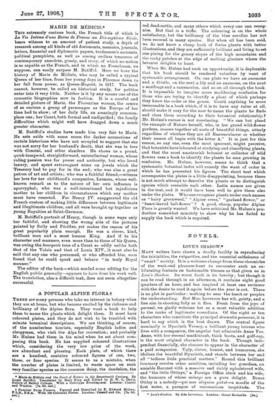MARIE DE MEDICIS.*
Tins extremely curious book, the French title of which is La Vie Intime d'une Reine de France au Dix-septierne Sieele, bears witness to an amount of patient study, a depth of research among all kinds of old documents, memoirs, journals, letters, financial and diplomatic papers, tradesmen's accounts, political pamphlets, as well as among endless treasures of contemporary anecdote, gossip, and story, of which no nation is so capable as the French, and in which no Frenchman, we suppose, can easily surpass M. Batiffol. Here we have the history of Marie de Medicis, who may be called a typical Queen of her time, from her young days in Florence down to her fall from power, as Queen-Regent, in 1617. The book cannot, however, be called an historical study, for politics enter into it very little. Neither is it by any means one of the romantic biographies now in fashion. It is a careful and detailed picture of Marie, the Florentine woman, the centre of as curious a group of personages as the Europe of her time had to show; of her daily life, an amazingly common- place one; her Court, both formal and undignified ; the family difficulties which might well have dragged down a much greater character.
M. Batiffors studies have made him very fair to Marie. He sets aside with some acorn the darker accusations of certain historians who have not scrupled to suggest that she was not sorry for her husband's death, that she was in love with Concini, and other slanders. He shows us a proud, quick-tempered, straightforward, unintellectual woman, whose ruling passion was for power and authority, but who loved luxury, and spent extravagant sums on jewels which the Treasury had to pay for in the end; who was also a great patron of art and artists; who was a faithful friend,—witness her love for her childhood's companion, Leonora, whose well- known remark as to the nature of her own influence is apocryphal; who was a well-intentioned but injudicious mother to her children in circumstances which any mother must have resented. For Henry IV. exaggerated the old French custom of making little difference between legitimate and illegitimate children, and all were brought up together as. young Royalties at Saint-Germain.
M. Batiffors portrait of Henry, though in some ways only too faithful, and showing the wrong side of the pictures painted by Sully and Perefixe, yet makes the reason of his great popularity plain enough. He was a clever, kind, brilliant man and a most human Xing. And if to his character and manners, even more than to those of his Queen, was owing the bourgeois tone of a Court so oddly unlike both that of the Valois and that of Louis XIV., it must also be said that any one who presumed, or who offended him, soon found that he could speak and behave "in truly Royal manner."
The editor of the book—which needed some editing for the English public generally—appears to have done his work well. The translation, also a difficult task, does not seem altogether successful.






















































 Previous page
Previous page